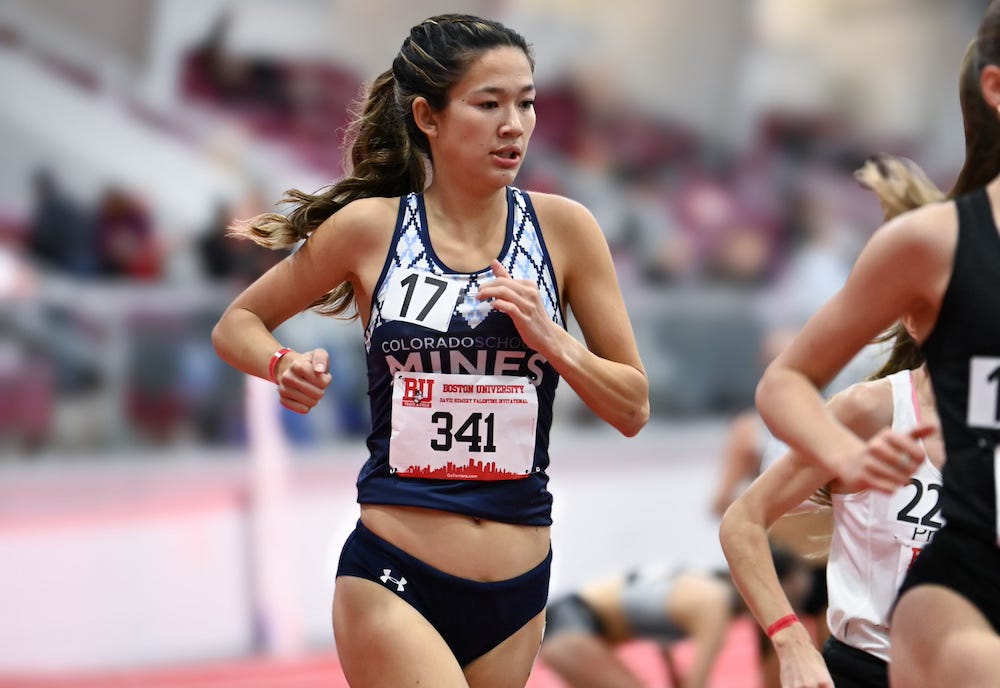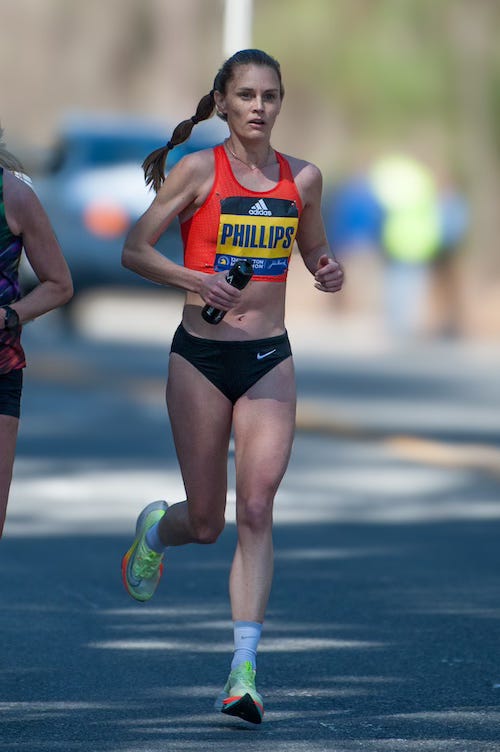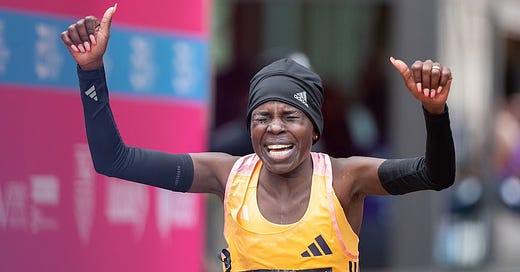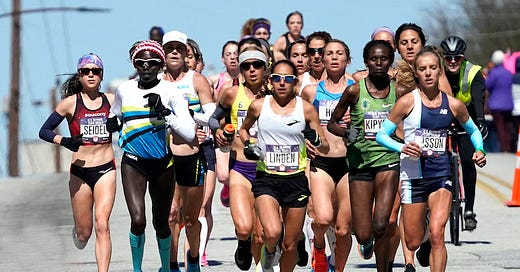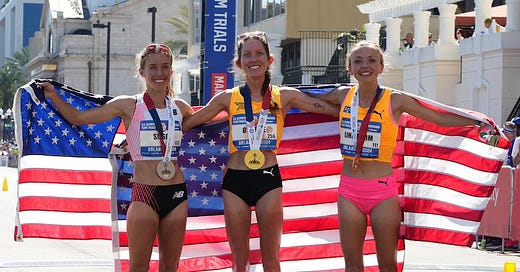

Discover more from Fast Women
Fast Women: Meet Zoe Baker, college runner and 2:35 marathoner
Tsige Duguma runs a world-leading 1:57.73 800m.
Issue 284
A thank you and an appeal
In my five-year update in December, I told you Fast Women was in a better place than ever heading into 2024, and that’s true. The newsletter has just shy of 10,000 subscribers, the open rate, around 77 percent, is as high as ever, and there has been a lot of enthusiasm about women’s running, especially as we begin an Olympic year. All of the most popular issues of the newsletter are from recent months.
But the year has gotten off to a challenging start financially, as sponsorship from brands has been slow in coming together. You may have noticed that I didn’t have a sponsor in January or March. I’m excited to introduce a new sponsor beginning next week, and another one this summer, but there are still a lot of holes to fill.
I turn to you for donations in this direct way once a year, and this year, your support is as crucial as ever. I love being able to bring you this newsletter. For the past five years, I’ve spent at least 50 hours a week, often much more, reading articles, watching events and interviews, listening to podcasts, hunting down results, speaking to athletes, writing this newsletter, keeping up a social media presence, and taking photos at events, along with handling all of the more mundane tasks that come with having a business. This is a full-time endeavor for me. (I get a lot of DMs mentioning “you all” or “your team,” and I certainly have some wonderful helpers, but most of the time, it’s just me.)
My hope is to make it easier for all of you to follow the sport, and to shine a light on athletes (as well as writers, podcasters, and other creators) who otherwise might not get a lot of attention. It’s also important to me to cover some of the negative aspects of the sport, because I love this sport and want to see it be better.
The growth of the newsletter has been gratifying. I appreciate hearing from you, the readers, about what’s on your mind each week, and I’ve enjoyed getting to know many of you on social media and a handful of you in person. For the past five years, my aim has been to keep this newsletter free, in order to help grow the audience for the sport.
I am incredibly thankful for the funding you all have provided thus far. There would be no Fast Women without you. Some of you are already Patreon supporters or made annual contributions when I provided my five-year update in December. If you have contributed recently, I am so grateful. For those who haven’t, if you have the means and are willing to make a contribution to help keep this venture going, I would appreciate your support via Venmo (@fastwomen) or Patreon. Any amount helps. Thank you so much.
Zoe Baker chose the NCAA track season over running the Olympic Trials
Not many athletes voluntarily passed up the opportunity to run at last month’s U.S. Olympic Marathon Trials, but Zoe Baker was one of them. Baker, 23, a graduate student at Colorado School of Mines, wanted to make the most of her last two seasons in the NCAA, chasing goals at shorter distances alongside her teammates, so she opted to run indoor and outdoor track instead.
Because of a combination of redshirting and the pandemic, Baker is in her sixth year of NCAA eligibility. She didn’t have cross country eligibility last fall, so she made her marathon debut at Bakline’s McKirdy Micro Marathon, where she ran 2:35:52 and earned a spot at the Trials. Skipping the Trials wasn’t an easy choice, but she’s planning to go all-in on the marathon after graduation.
Making her marathon debut
It’s rare for NCAA distance runners to run marathons, but Baker thinks it’s likely to be her best distance, and she had wanted to run one for years. Her coach, Chris Siemers, an Olympic Marathon Trials qualifier himself, was supportive of her goal and wrote all of her training. Baker did part of her buildup in the Bay Area, where she was doing a co-op at a software engineering company. She did a lot of her California training alone, but she also found some locals to join her. “I’m always on Strava or Instagram, trying to find women I can run with,” she told Fast Women. “I love running with people. I will absolutely yap someone’s ear off during a run.”
Her volume peaked at just over 90 miles per week, and she documented some of her training in a humorous manner, on TikTok. Her parents, who live in Colorado, flew in for the race, which took place in Valley Cottage, New York, north of New York City.
In training, Baker practiced taking a gel every three miles, and having a strong stomach, she figured fueling well would be her superpower. But in retrospect, she thinks she overdid her pre-race fueling. “I felt like I left the Thanksgiving dinner table and started running,” she said.
When it was time to take her first gel, she couldn’t. “I was like, ‘I don’t know what’s going to happen if I don’t take this gel, but I do know what’s going to happen if I do take it. And puking right now seems like the worst option of those two.’” But she reassured herself that she was burning fuel quickly and by mile six, she was able to start taking gels.
Baker focused on relaxing, and she chatted with some of the other runners in the pack here and there. The pace felt easy and the conditions were great. She was starting to feel a bit antsy, thinking about the fact that Siemers had told her that if she felt good, she should make it a race with 10K to go. But right around the 20-mile mark, she got clipped by another runner and fell hard. With everyone trying to stay on the tangent line painted on the course, it was difficult to avoid being in other people’s space.
But Baker popped up and took off after the pack. She glanced at her watch and noticed that thanks to the adrenaline, she was running 5:15 pace, so she backed off. She reeled the pack back in, ran with them briefly, and then decided to keep her momentum going and pulled away. The closing miles hurt, but she got progressively faster and crossed the finish line with blood streaming down her legs, from the fall.
Even with the bloody knees, Baker had a fantastic experience in her marathon debut. Recovery was a little tougher than she anticipated. Though she’s not normally very good about taking time off, the marathon forced her to. And by February, she ran 16:12.55 in the indoor 5,000m.
From JV runner to All-American
Baker grew up in Longmont, Colorado, minutes away from where members of the On Athletics Club now train. “You can’t get any of the (Strava) segments near my house,” she said.
Her mother is a good athlete—she played basketball for her college in China, and once she came to the U.S., she added volleyball, indoor soccer, competitive skiing, and Olympic weightlifting, among other things. Baker says her mom tried to get her into “contact sports and entertaining team sports,” but she didn’t have the coordination. She thinks it was her dad who sparked her interest in running, because sometimes they’d go on short trail runs together.
Baker skied, played soccer in middle school, and started running track in eighth grade. She wasn’t bad, but her times didn’t scream future All-American. She remained on her school’s JV team through sophomore year, and didn’t break 6:00 in the mile or 20:00 in the 5K until her junior year. It didn’t occur to her to train during the summer or on the weekends.
She began high school at Boulder’s Fairview High School, so she could do an International Baccalaureate program, but she wasn’t prepared for the academic load. During her sophomore year, her academic and social anxiety grew strong enough that she was unable to attend school. She transferred to an online school that spring. Baker had to miss the track season, which made her realize how much she enjoyed being on a team. She began to run consistently on her own.
For her junior year, she returned to in-person school, switching to Silver Creek High School, closer to her home. And with a summer of training behind her, she had a breakthrough year. In October of her senior year, when she signed with Mines, she was still blown away by the fact that she was good enough to run in college. At the time, she had run only 5:35 for 1600m and 11:47 for 3200m.
Baker improved significantly her senior year of high school, lowering her 1600m to 5:15, her 3200m to 11:14 and her 5K to 18:25. It didn’t take her long to become the number one runner at Mines. But during her six years of college, the level of competition in DII has increased significantly, as has the talent on her team. It’s not easy to recruit women to a school that offers only engineering majors, and nearly 70 percent of the student body is male. But Siemers relies heavily on developing the talent he gets, and he’s done a good job of it. Baker now has six or seven other women pushing her in practice.
A nine-time DII All-American, Baker has personal bests of 9:33.05 for 3,000m, 16:07.72 for 5,000m, and 33:52.75 for 10,000m. She thinks the biggest factor in her improvement is her durability. She estimates she ran 20 miles per week at the beginning of high school, now she’s able to handle 70–80 miles per week during the track season, and more during marathon training. Strength training has helped her stay healthy, and she also chalks some of it up to luck.
She used to go too hard in workouts. “Now I’ve learned that the best way to train is apparently not redlining every single time you do anything,” she said.
She’s also very in tune with her body and when she feels an injury coming on, she knows she needs to eat more and train less right away. Baker says she underfueled during high school and was amenorrheic for roughly two years, but she began eating more in college and her period came back. “I was like, ‘Do you want to break? Or do you want to not break and get better?’” she said.
The horror stories about college teams and eating disorders make the rounds, and Baker says she has heard them, but she describes her team as the healthiest group of women she has ever met. “The team culture is incredible,” she said. “There are just a lot of positive role models in every single aspect—fueling yourself, taking your training seriously, getting cool internships, and getting cool engineering jobs. It’s the team environment that my high school self needed.”
Moving forward
Baker has also excelled academically at Mines. In 2022, she graduated with a double degree in computational and applied math and computer science, and now she’s earning a master’s degree in computer science. She has won the NCAA’s Elite 90 award, which goes to the athlete with the highest GPA at each NCAA championship, four times. And in 2022, she was named an NCAA Woman of the Year finalist.
Baker is still figuring out where her career will take her, but she has already made some post-collegiate racing plans. After the track season, she plans to run the Garry Bjorklund Half Marathon in Duluth, Minnesota, in June. And she has signed up to run the Chicago Marathon in October. Siemers has raised the idea of trying to break 2:30. “That sounds very aggressive,” she said. “We’ll see how training goes.”
But first, she has an outdoor track season to run, and she would like to lower her 5,000m personal best before she’s done in the NCAA. Her first opportunity to give it a shot will be at the Bryan Clay Invitational on April 12. “I’ve been flirting with the 16-minute barrier for too long and I just want to break it,” she said. “I feel like I’m in the shape to do it, I just need things to go right. It would be so amazing to break it honestly for no other reason than I think 15-something sounds super fricking cool.”
News and Links
If you got your news only through running headlines, you might assume that giving birth leads to better running performance. Especially lately, when so many new moms are running so well. The athletes who struggle are less likely to make headlines, but there are a wide range of experiences out there, and those who bounce back quickly, better than ever, are outliers. I appreciate Caitlin Phillips’ openness in discussing her postpartum running struggles in this piece Melissa Dahl wrote for Romper.
On a related note, last week Molly Huddle and Alysia Montaño announced their new podcast series, The Mother Lane, where they’ll discuss the intersection of motherhood and sport. Their first guest was Makenna Myler, and though Myler has been on a number of podcasts recently, they covered some motherhood-related topics Myler hadn’t talked about elsewhere.
Sarah Lorge Butler wrote a good article about Olympic Marathon Trials champion Fiona O’Keeffe. (Runner’s World) O’Keefe’s coach, Amy Cragg, told Lorge Butler that O’Keeffe’s marathon buildup was one of the best she has seen or been around. “Pretty much everything we threw at Fiona that you have to be good at, she handled no problem,” she said. “It just came so naturally for her.”
Karissa Schweizer was on an episode of Tracklandia Live last week, following her return to racing at the TEN. She said she considered trying to get the Olympic 10,000m standard (30:40) on the roads, now that that’s an option. “Our guys’ team was going to Kipchoge-style the pace job for me,” she said. But she chose the TEN because they couldn’t find the right road racing opportunity.
Did you, or anyone you know, run the inaugural women’s U.S. Olympic Marathon Trials in 1984? The Trials Legacy Committee is organizing a reunion May 16–19 in Olympia, Washington. More information here, and details on how to sign up here.
A new season of Road to TrackTown has launched on YouTube, and I enjoyed the first episodes with Nikki Hiltz, Britton Wilson, and hammer thrower Janee’ Kassanavoid.
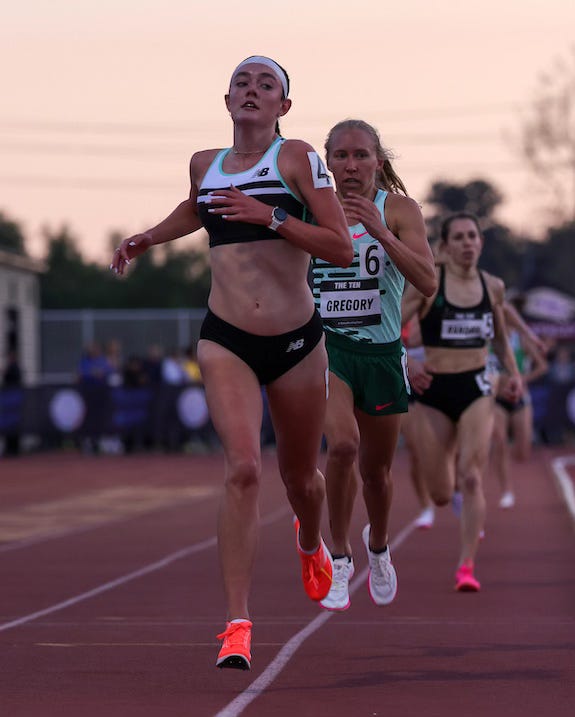
Results Highlights
World Indoor 800m champion Tsige Duguma of Ethiopia won the 800m at the African Games, held in Accra, Ghana, running a world-leading 1:57.73. She didn’t race Kenya’s Mary Moraa, the reigning world champion in the 800m outdoors, because Moraa dropped down to the 400m, and won in 50.57. (More African Games results)
Jess Hull won the 3,000m at the Sydney Track Classic, which doubled as the Australian 3,000m championships, in 8:37.18. Georgia Griffith (8:37.85) and Rose Davies (8:39.81) finished not far behind. Abbey Caldwell won the 800m in 1:59.71 and Catriona Bisset took second in 2:00.29. (Results)
In her first race of the outdoor season, LSU’s Michaela Rose broke the collegiate 600m record, running 1:25.75. Avi’Tal Wilson-Perteete of Texas A&M previously held the record, at 1:28.02. The distance isn’t run often outdoors—the indoor record, Britton Wilson’s 1:25.16 from last year, is faster. But Rose’s outdoor season is off to a strong start.
California high school junior Sadie Engelhardt lowered her 800m PR to 2:03.48 with a win at the Meet of Champions Distance Classic, at Azusa Pacific University. She talked about her win here. (Results)
At the USATF Masters Indoor Nationals, Sue McDonald set an American 60–64 age-group record in the mile, running 5:31.77. She was less than a second off the 5:30.89 world record Great Britain’s Clare Elms set earlier this year. The meet featured many other records and impressive performances, though hunting for them in the results can take some work.
Amy Davis-Green won Chicago’s Shamrock Shuffle 8K in 25:54 and it was a Hansons-Brooks sweep as Jessie Cardin (26:03) and Anne-Marie Blaney (26:11) took second and third, respectively. (Results)
I lost enthusiasm for following Gary Cantrell’s events in recent years because of the controversies surrounding them. That includes preventing a team (Runner’s World) from using the name “Black Lives Matter” at one of his virtual races, allowing a license plate with a confederate flag to be displayed at his race, and his insistence that he doesn’t “do political.” And that doesn’t change just because a lot of people are excited about what happened at the Barkley Marathons last week. There’s no question Jasmin Paris is an impressive athlete. If you’re looking for coverage of her run, there’s plenty out there; in fact, I think it may have gotten as much mainstream attention as any of Faith Kipyegon’s world records did last summer. I’m just not a good source, because I haven’t been following it.
Podcast Highlights
It was great to get a Kate Grace update last week on I’ll Have Another. The episode was recorded in early February and at the time, she was planning to open up her outdoor season in late April or early May. That will be her first time racing in about 2.5 years. Grace confirmed that she’s training on her own now. She said that now that she’s 35, her speedwork needs to be more specific to her needs. Training on her own also allows her to practice when she wants and experiment with what works best for her. Grace is self-coached right now, but she said she plans to consult with a few mentors down the line, as her training picks up. And for more from Grace, she told her birth story, in three parts, on Instagram last week. (part one | part two | part three)
Camille Herron provided more details about Lululemon’s Further initiative on The Freetrail Podcast. She said the company originally proposed doing a backyard ultra type event, but she was the one who told them it needed to be a six-day race. She said she had no say in the course and setting of the race, so to her, it felt like a six-day cross country race, run on mostly dirt roads and gravel. Because the course and the weather were not ideal, she adjusted some of her expectations early on. A major part of the event involved collecting data on the participants, to conduct scientific research, and she said that the blood draws, urine collection, weighing, and so on made things more challenging than a normal race.
Lindsay Flanagan discussed her Olympic Marathon Trials experience on Relay. She said she woke up on race day feeling nauseous, and for the first 10 miles, she was throwing up bile. Then she needed a bathroom, and she couldn’t find one on the course, even though she’s sure there must have been something out there. Given how she was feeling, it’s impressive that she hung on and finished eighth. Flanagan is preparing for the Hamburg Marathon on April 28.
TrailblazHers co-founder Liz Rock discussed her journey to this year’s Boston Marathon on Women’s Running Stories, and it’s powerful. She decided to run the race partially in response to the policing of the mile 21 cheer zone at last year’s race. “I guess a part of me thinks this is a little form of protest,” she said. “I want to take that narrative back from what happened last year.”
I loved learning more about Carolina Rubio-MacWright on a recent episode of Trail Society. Rubio-MacWright is doing a lot of interesting advocacy work in and out of the sport, and she’ll be running the Western States 100 in June. She comes on at the 16:25 mark.
It was fun to get an update on former Stanford star Dr. Katy Trotter, who is now a podiatrist in New Jersey, on What’s Inside the Box? (Note: Link updated)
Additional Episodes: Eating disorder sports therapist Kara Bazzi on The Lane 9 Podcast | NCAA DIII 800m champion Emma Kelley, who will run for Wisconsin next year, on DIII Glory Days | Kara Goucher on Rich Roll | Emily Sisson on the Ali on the Run Show | Mark Coogan, coach of New Balance Boston, on Citius Mag | Amanda McGrory talked all things wheelchair racing on C Tolle Run | Kendra (Chambers) Coleman on Hear Her Sports
Upcoming
The World Cross Country Championships will take place in Belgrade, Serbia, on Saturday. Watching live will require an early wakeup in the U.S.; the U20 race starts at 6:00 a.m. ET, the mixed relay is at 7:15, and the senior women go off at 7:45. All of the races will stream live on Peacock. You can access start lists, the schedule, and eventually results here. Sifan Hassan announced last week, via her Instagram stories, that she has decided to skip the event. “I prefer to give my body more time to recover from the marathon and focus on what is ahead,” she wrote. She ran the Tokyo Marathon on March 3.
I hope you all have a great week!
Alison
Subscribe to Fast Women
The latest in women's competitive distance running.





